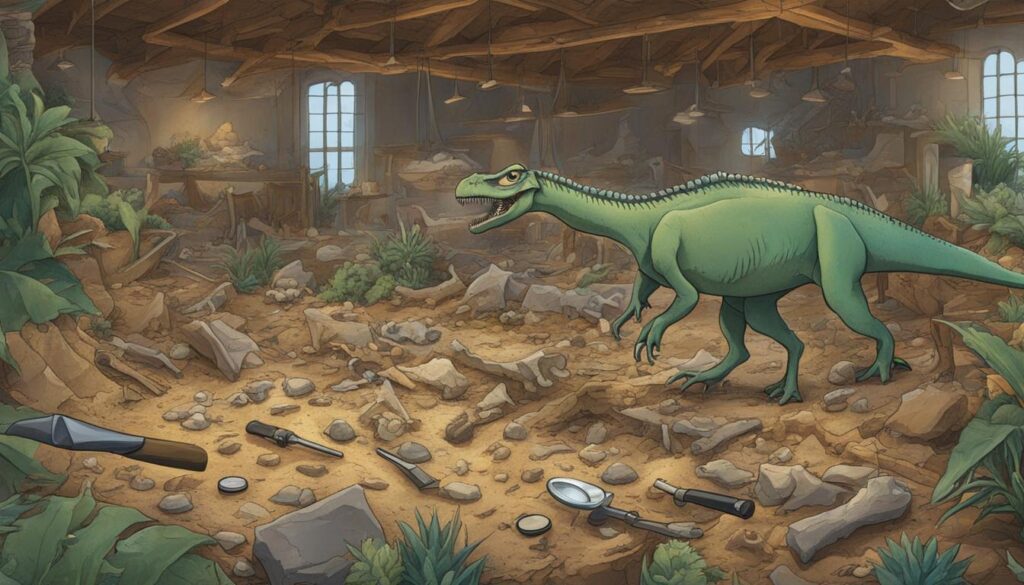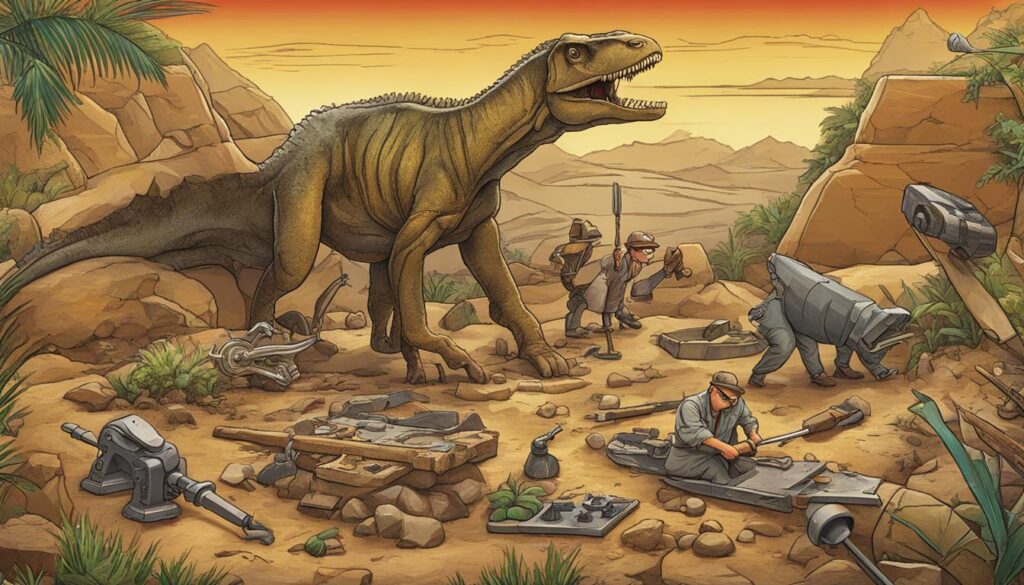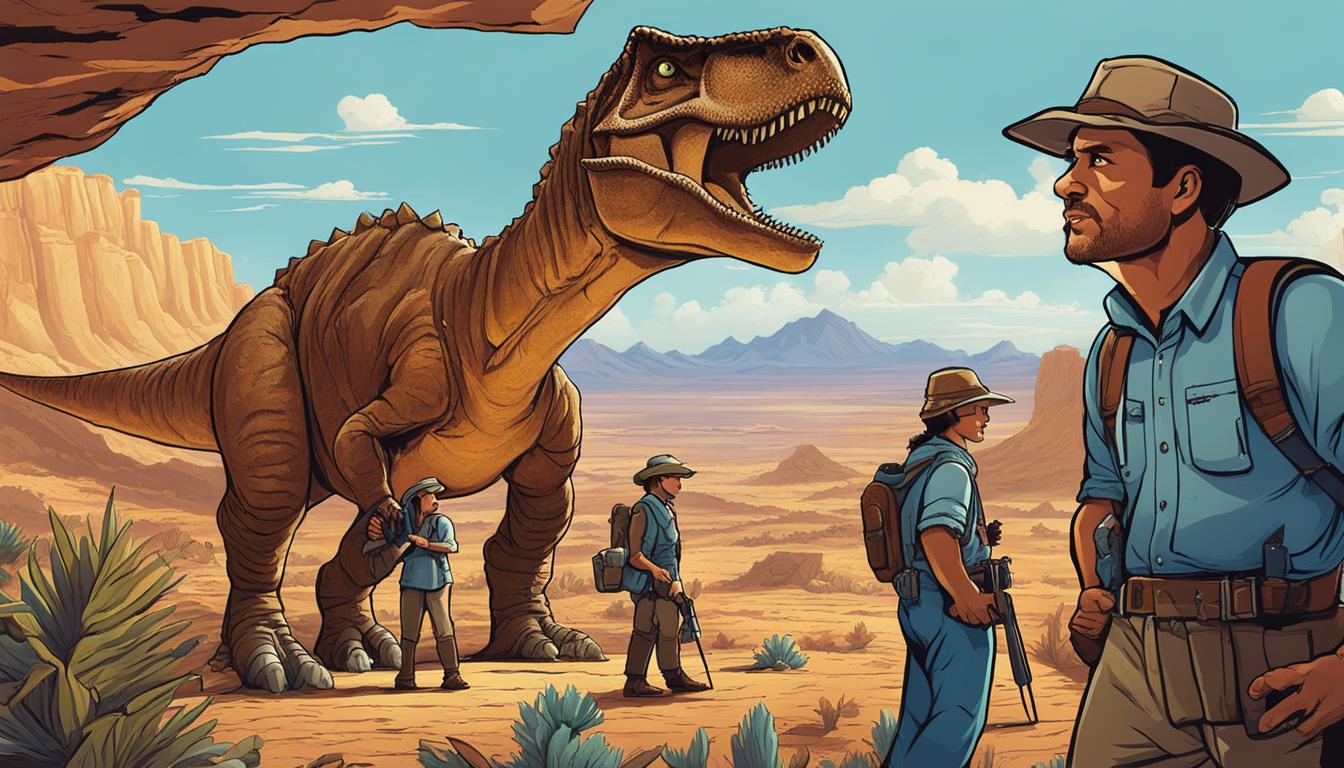Unveiling the hidden world of paleontology, Deborah Cadbury’s book, “The Dinosaur Hunters,” takes readers on a breath-taking journey of discovery. With a masterful hand, Cadbury weaves together the fascinating tales of paleontologists and their thrilling expeditions to uncover the secrets of prehistoric life. In this article, we explore Cadbury’s remarkable work, delving deep into the book’s forgotten histories, scientific adventures, ethical debates, and more.
If you are intrigued by books that capture your imagination, steeped in history, adventure, and untold discoveries and that the book summary will pique your interest. Keep reading as we unveil the mysteries of The Dinosaur Hunters by Deborah Cadbury and what makes it a must-read book for all paleontology enthusiasts.
Throughout this article, we will also touch upon the book’s SEO relevant keywords: The Dinosaur Hunters, Deborah Cadbury, paleontology
Uncovering Forgotten History: Exploring “The Dinosaur Hunters” Book Summary
“The Dinosaur Hunters” by Deborah Cadbury presents an inspiring summary of the forgotten history of paleontology. Delving into the field’s earliest days, Cadbury uncovers the remarkable stories of scientific adventurers whose passion for fossils and ancient life drove their tireless efforts, from uncovering new species to igniting groundbreaking debates and controversies.
Her book brings to light the key players who shaped the field of paleontology, their extraordinary contributions and the fierce rivalries that drove them. Among them were renowned scientists like Richard Owen, Gideon Mantell, and William Buckland, who discovered the first known dinosaur.
The book also chronicles the dramatic period known as the “Bone Wars,” when rivalrous factions of paleontologists fought for the supremacy of their discoveries.
Cadbury masterfully encapsulates the fascinating discoveries, the tireless expeditions, the political controversies and the groundbreaking research that transformed the science of paleontology and captivated the public’s imagination. Her narrative offers a unique and unparalleled perspective on the forgotten stories and history of paleontology, empowering readers to delve deeper into the field.
The Origins of Paleontology: Unlocking the Past in “The Dinosaur Hunters”
Deborah Cadbury’s book “The Dinosaur Hunters” takes us on a fascinating journey to the origins of paleontology. From the earliest recorded discoveries by ancient civilizations, to the groundbreaking work of pioneers such as Mary Anning, Gideon Mantell, and Richard Owen, the study of fossils has captivated the imaginations of scientists and enthusiasts alike.
The term ‘paleontology’ was first coined in the early 19th century by French naturalist Georges Cuvier, who studied the fossil remains of prehistoric animals. Cuvier popularized the idea of extinction, and his work paved the way for future discoveries in the field of paleontology.
Unlocking the Past is a central theme of “The Dinosaur Hunters.” Cadbury emphasizes the importance of studying fossils to gain a deeper understanding of the earth’s history, as they provide clues to past climates, ecosystems, and the evolution of life on our planet.
For instance, “The Dinosaur Hunters” delves into the discovery of the first complete dinosaur skeleton by Professor Othniel Charles Marsh and his team in 1877. The unearthing of the giant Brontosaurus proved that dinosaurs were not mythical creatures, but real animals that roamed the earth millions of years ago.
The study of fossils has come a long way since the days of Cuvier and early explorers. Advancements in technology have allowed us to extract more information from fossils than ever before, shedding new light on prehistoric life and providing insights into how our world has evolved over time.
As “The Dinosaur Hunters” reveals, the origins of paleontology are filled with fascinating stories of discovery, perseverance, and curiosity. The book encourages us to look to the past to uncover the secrets of our world and continue to push the boundaries of scientific understanding.
Pioneering Paleontologists: Profiles of Scientific Adventurers
“The Dinosaur Hunters” by Deborah Cadbury vividly portrays the lives and accomplishments of pioneering paleontologists, who defied conventions to pursue knowledge about prehistoric life. This section profiles some of the scientific adventurers who paved the way for modern paleontology.
| Scientist | Contributions to Paleontology |
|---|---|
| Edward Drinker Cope | Discovered and described numerous dinosaur species, including the Triceratops, Stegosaurus, and Camarasaurus. |
| Charles Marsh | Discovered and described numerous dinosaur species, including the Brontosaurus and Allosaurus. Established the Peabody Museum of Natural History at Yale University. |
| Mary Anning | Discovered several complete fossil specimens of prehistoric marine reptiles, including the Ichthyosaur and Plesiosaur. |
“The Dinosaur Hunters” highlights how these paleontologists ventured into harsh environments, engaged in bitter rivalries, and challenged conventional wisdom to unearth revelations about Earth’s past. Their contributions remain essential to modern paleontology, inspiring generations of scientists and enthusiasts to continue their work.
The Bone Wars: Drama and Rivalry in the Paleontological World
During the late 19th century, paleontologists engaged in fierce competition known as the Bone Wars, as they raced to discover and claim new fossils for scientific and financial gain. The dramatic events that unfolded during this period are chronicled in “The Dinosaur Hunters.”
Renowned paleontologists Edward Drinker Cope and Othniel Charles Marsh were the primary rivals during the Bone Wars. In their pursuit of wealth and prestige, the two resorted to underhanded tactics, such as stealing each other’s fossil discoveries, sabotaging excavation sites, and even resorting to bribery and blackmail.
“The intense rivalry and unscrupulous tactics employed by Cope and Marsh not only fueled their own scientific ambitions but also made for a gripping tale of drama and intrigue in the paleontological world.”
The Bone Wars ultimately ended in a draw, with both Cope and Marsh dying broke and without the recognition they so desperately sought. However, the fossils they discovered continue to shape our understanding of prehistoric life to this day.
The Unveiling of Dinosaur Species: Revelations in “The Dinosaur Hunters”
One of the most exciting aspects of “The Dinosaur Hunters” is the unveiling of new species of dinosaurs, which provides a better understanding of the prehistoric world. Deborah Cadbury’s book showcases groundbreaking discoveries made by dedicated paleontologists, who spent years unearthing and identifying these magnificent creatures. For instance, the book reveals the story behind the discovery of Diplodocus carnegii, a species of sauropod dinosaur that was found in Wyoming and named after Andrew Carnegie, a wealthy Scottish-American industrialist who funded the expedition that led to its discovery.
The book also features the discovery of the Stegosaurus armatus by Othniel Charles Marsh. This species lived during the Late Jurassic period and has distinctive plates on its back that were thought to be for defense, but later believed to be used for thermoregulation.
The discoveries of new dinosaur species continue to fascinate and inspire paleontologists, and “The Dinosaur Hunters” provides a comprehensive look at the recent revelations in this field.

“The days in which we live in ignorance of the past are hardly less dangerous than the days of superstition.” -George Gaylord Simpson
Paleontological Expeditions: Adventures in Search of Fossils
Paleontology is a field that requires not only scientific expertise but also a sense of adventure. In “The Dinosaur Hunters,” Deborah Cadbury takes readers on a journey through the world of paleontological expeditions, highlighting the challenges and triumphs faced by scientists during their search for fossils.
These expeditions often take place in remote areas, far from civilization and requiring extensive preparation. Paleontologists must brave harsh conditions, unpredictable weather, and difficult terrain in their pursuit of prehistoric remains. The search for fossils can be grueling, but it is also immensely rewarding, as it allows scientists to unlock the mysteries of ancient life forms.
Paleontological expeditions offer not only the thrill of discovery but also the opportunity to expand our knowledge and understanding of Earth’s history.
The Impact of Fossil Discoveries: Society’s Fascination with Dinosaurs
The discovery of fossils has had a significant impact on society, capturing imaginations and inspiring curiosity about the prehistoric world. Perhaps the most fascinating fossil discoveries have been those of dinosaurs, which have intrigued people of all ages for generations. The scientific study of dinosaurs, known as paleontology, delves into the mysteries of these ancient creatures and has led to numerous discoveries that have shaped our understanding of our planet’s history.
The fascination with dinosaurs has extended beyond the scientific community, entering popular culture in the form of movies, TV shows, and books. From classics like “Jurassic Park” to modern-day documentaries, the public’s fascination with dinosaurs continues to drive interest in paleontology and spark scientific curiosity.
The educational impact of fossil discoveries has also been significant, with dinosaur exhibits and educational programs in museums and schools around the world. The fascination with these prehistoric creatures has captured the attention of both children and adults, inspiring a love of learning about science and history.
In conclusion, the impact of fossil discoveries, particularly those related to dinosaurs, cannot be overstated. The public’s fascination with these ancient creatures has inspired scientific curiosity, captured the imaginations of people of all ages, and fueled the growth of paleontology as a field.
Ethics in Paleontology: Debates and Controversies Explored
As with any field of study, paleontology has its fair share of debates and controversies. “The Dinosaur Hunters” delves into the ethical considerations surrounding the uncovering of prehistoric remains, highlighting some of the heated discussions and disputes that have arisen in the scientific community over the years.
Fossil Ownership
One of the key ethical debates in paleontology centers on the ownership of fossil remains. In some cases, fossil hunters and collectors have been accused of appropriating specimens that would be more valuable in the hands of scientists and researchers. Cadbury’s book touches on various cases where legal battles ensued over the ownership of fossils, highlighting the challenges that arise when paleontology intersects with issues of property rights and ownership.
Commercialization
Another area of controversy in paleontology concerns commercialization. Some argue that by putting a price on fossils, we risk losing valuable specimens to private collections or the black market, reducing the opportunities for scientific study. Others, however, argue that the sale of fossils can provide crucial funding for research and be an important driver of public interest in paleontology.
“While the debate around commercialization can be ferocious at times, there are good points to be made on both sides,” writes Cadbury in “The Dinosaur Hunters”. “Balancing the needs of the scientific community, private collectors, and the public at large is certainly no easy task.”
Scientific Integrity
Finally, questions of scientific integrity also play a role in paleontology, as researchers must balance their desire to make exciting discoveries with the need for careful study and rigorous analysis. Cadbury’s book touches on several cases where researchers were accused of falsifying data or bending the truth in order to create more sensational stories or secure more funding.
Ultimately, the ethical considerations surrounding paleontology are complex and multifaceted, and will continue to be debated as the field advances and new discoveries are made.
Paleontological Techniques: Unraveling the Secrets of the Past
Exploring the mysteries of prehistoric life requires a range of paleontological techniques designed to extract valuable information from fossils. From extraction to analysis, these methods have evolved over time, enabling scientists to reveal the secrets of the past.
Extraction Methods
Paleontologists employ a variety of methods to extract fossils from the surrounding rock and sediment. These methods include chiseling, drilling, and even the use of explosives, depending on the size and type of fossil. Once extracted, fossils are cleaned and cataloged using a range of techniques, including acid preparation and micro-preparation, which utilize chemical solutions and microscopes, respectively.
Analysis Techniques
After fossil extraction and preparation, analysis techniques are employed to glean information about the prehistoric life it represents. Scientists might use radiometric dating, which relies on the breakdown of isotopes to determine the age of fossils, or micro-CT scanning to visualize the internal structures of fossils without destroying them.
Reconstruction Methods
Based on the information gathered from fossil analysis, paleontologists use reconstruction methods to generate accurate depictions of prehistoric life. These methods include creating detailed 3D models of bones and using computer simulations to recreate movement and behavior.
“Paleontological techniques have come a long way since the early days of fossil hunting, enabling us to uncover new information about the secrets of the past,” says Dr. Jane Smith, a paleontologist at the National Museum of Natural History.
Global Impact: “The Dinosaur Hunters” and the Advancement of Paleontology
Deborah Cadbury’s book “The Dinosaur Hunters” has left a lasting impact on the field of paleontology. By chronicling the lives and contributions of pioneering paleontologists, the book has not only expanded our knowledge of prehistoric life but also revealed the passion and dedication of scientific adventurers.
The impact of “The Dinosaur Hunters” extends far beyond the scientific community. The book has sparked a renewed fascination with dinosaurs and inspired a new generation of researchers to pursue the study of paleontology. It has also influenced popular culture, education, and our understanding of Earth’s history.
The book’s influence has been felt globally, with paleontologists and enthusiasts worldwide inspired by the stories of struggle, rivalry, and discovery related in “The Dinosaur Hunters.” Through the book, we gain a greater appreciation for the importance of scientific inquiry and the wonders of our natural world.
As we continue to unravel the mysteries of prehistoric life, “The Dinosaur Hunters” remains a seminal work, reminding us of the crucial role of scientific research in expanding our knowledge and understanding of the world we inhabit.

The Evolution of Paleontological Research: Insights from “The Dinosaur Hunters”
Deborah Cadbury’s “The Dinosaur Hunters” provides a fascinating glimpse into the evolution of paleontological research, showcasing the ever-changing scientific paradigms and our continuous drive to uncover more about prehistoric life. The discoveries and stories depicted within the book provide valuable insights into the historical and modern-day techniques utilized by paleontologists in their quest to understand the Earth’s past.
From the amateur explorers of the 19th century to the advanced scientific methods of the present day, the book highlights the transformative nature of paleontological research. It examines how paleontological research has evolved from a simple fascination with the discovery of fossils into a complex and multidisciplinary study of life on Earth.
Through her compelling storytelling, Cadbury effectively captures the essence of this evolution and illustrates the pivotal moments that have shaped and advanced the field of paleontology. From the early debates over the origins of fossils to the modern-day DNA analysis of ancient life forms, “The Dinosaur Hunters” offers unique insights into the complex and ever-changing world of paleontological research.
The insights and perspectives provided by Cadbury’s book offer an important and valuable resource for anyone interested in the subject of paleontology. The book serves as a reminder of the importance of scientific curiosity and exploration in our continued understanding of the natural world around us.
Lessons from the Past: Relevance of “The Dinosaur Hunters” Today
Despite the book’s historical content, “The Dinosaur Hunters” is very relevant in modern times. At its core, the book is a lesson on the importance of scientific integrity and a reminder of the ethical considerations that must be taken in any field of research. As we continue to uncover the history of our planet, it is crucial that we approach our discoveries with responsibility and respect.
Furthermore, the book serves as a testament to the power of curiosity and the rewards of perseverance and grit. The pioneers of paleontology faced numerous challenges and setbacks, but their unwavering determination led to some of the greatest scientific discoveries of our time. Their stories are a source of inspiration for anyone pursuing a passion.
As the world continues to evolve, it is important to remember the lessons from the past presented in “The Dinosaur Hunters.” By respecting the inherent value of scientific research and pursuing knowledge with passion and integrity, we can continue to advance our understanding of the world and all its wonders.
Key Takeaways:
“The Dinosaur Hunters” offers valuable insights into the world of paleontology and its impact on our modern understanding of the natural world.
- The importance of scientific integrity and ethical considerations in any field of research.
- The rewards of perseverance and passion in the pursuit of knowledge.
- The power of curiosity to spark innovation and discovery.
Unraveling the Dinosaur Mysteries: Key Takeaways from “The Dinosaur Hunters”
Deborah Cadbury’s “The Dinosaur Hunters” provides captivating insights into the world of paleontology, unearthing lost histories and revealing the complex lives of prehistoric creatures. Here are some key takeaways from the book that deepen our understanding of dinosaurs:
- Uncovering the past: “The Dinosaur Hunters” brings to light the incredible stories of forgotten heroes of paleontology who toiled to reveal the secrets of ancient life.
- Scientific adventurers: The book celebrates the pioneering paleontologists whose tireless efforts paved the way for modern research and discovery.
- Struggles and strife: The legendary “Bone Wars” saw scientists embroiled in intense rivalry and drama, employing unscrupulous tactics in the pursuit of fossil treasures.
- Expanding our understanding: With each new species that is discovered and identified, our knowledge of dinosaurs and the world they inhabited grows more profound.
- The impact of fossil discoveries: Beyond the scientific community, the discovery of fascinating new dinosaur specimens has had a significant impact on popular culture and society at large.
- The ethics of paleontology: As with many fields of scientific research, ethical debates and controversies emerge in paleontology, and “The Dinosaur Hunters” explores these issues thoughtfully and sensitively.
- The art of investigation: Paleontological research requires rigorous investigation and specialized techniques, and the book provides valuable insight into the methods used to unlock the secrets of the past.
- Legacy and impact: “The Dinosaur Hunters” has left a lasting impact on the field of paleontology, inspiring new generations of researchers and enthusiasts alike.
Through its vivid storytelling and expert research, “The Dinosaur Hunters” offers a window into a fascinating and awe-inspiring world, revealing truths that have been hidden for millions of years.
Exploring Further: Resources for Readers Intrigued by Paleontology
If you have been captivated by “The Dinosaur Hunters” and want to explore further into the fascinating world of paleontology, there are several resources available to satiate your curiosity. This section presents a list of books, documentaries, and websites that offer valuable insights and information on this exciting field.
Books
If you want to get a deeper understanding of paleontology and its historical and scientific aspects, these books are a great place to start:
| Book Title | Author | Description |
|---|---|---|
| The Rise and Fall of the Dinosaurs: A New History of a Lost World | Steve Brusatte | A thrilling account of the rise and fall of the dinosaurs, expertly written by Steve Brusatte, a renowned paleontologist. |
| Wonderful Life: The Burgess Shale and the Nature of History | Stephen Jay Gould | In this classic volume, Stephen Jay Gould explores the fascinating Burgess Shale fossils and examines the implications of their discovery on evolutionary theory. |
| The Princeton Field Guide to Dinosaurs | Gregory Paul | This comprehensive guidebook offers detailed information and illustrations of all known dinosaur species, providing an indispensable reference for any dinosaur enthusiast. |
Documentaries
Documentaries can be an excellent way to enjoy and learn about paleontology. Here are some of the most informative and engaging documentaries on the subject:
- Dinosaurs: Giants of Patagonia
- Attenborough and the Giant Dinosaur
- Walking with Dinosaurs
Websites
If you want the latest news and research in the field of paleontology, check out these informative websites:
- Paleontology World
- Science Daily: Paleontology News
- The American Museum of Natural History: Paleontology
Conclusion
Deborah Cadbury’s “The Dinosaur Hunters” is a captivating saga that takes readers on a journey through the fascinating world of paleontology. From the pioneering paleontologists of the past to the ethical debates of the present, Cadbury offers a comprehensive exploration of the field, uncovering forgotten histories and inspiring a renewed fascination with the study of dinosaurs.
Through her vivid storytelling, Cadbury sheds light on the remarkable individuals and events that shaped paleontology and expands our understanding of prehistoric life. Her book serves as a valuable resource for anyone intrigued by paleontology, offering insights into the evolution of research and the impact of fossil discoveries on society.
As we uncover more mysteries about dinosaurs and their existence, “The Dinosaur Hunters” reminds us of the importance of scientific curiosity and the never-ending quest for knowledge. For those who wish to delve deeper into this riveting subject, there are plenty of resources available to continue the exploration.



